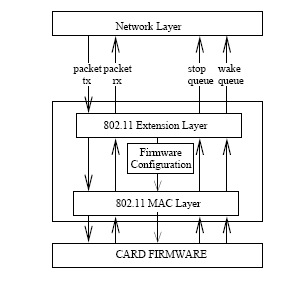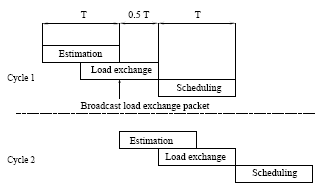| Version 8 (modified by , 20 years ago) ( diff ) |
|---|
WinlabMadwifi → Pipeline MAC paper Discussion
Paper Title:
Cooperative Scheduling Via Pipelining in 802.11 Wireless Networks
Download pdf
Ramana Rao Kompella, Sriram Ramabhadran, Ishwar Ramani, Alex C. Snoeren
University of California, San Diego
Motivation
- Per packet Micro-scheduling need firmware/hardware(MAC) upgrade
- Macro-scheduling could be done in multiple packet basis periodically, e.g 10ms.
- Cooperative scheduling extensions can be supported using a new layer on top of the existing MAC layer.
Features of Scheme
- each node conducts "global scheduling" based on "load information" of all other nodes.
- the global scheduling determines a TDMA-like slot/bandwidth allocation
- 3 stages, 2 ½ pipelining:
- Estimation — load exchange — scheduling
- equivalent to predict — signaling — access
- "load excange" phase overlapping with "estimation"
- First cycle's scheduling overlap with second cycle's "load exchange" phase
- Kernel code modification
- packet_tx
- packet_rx
- stop_queue
- wake_queue
Diagrams
Figure 1: 802.11 extension layer architecture
Figure 2:2.5-stage pipeline architecture. Each pipeline stage is equal in duration, but estimation stage and load exchange stage for a given cycle overlap with each other.
Experiment Evaluation
using 2 nodes and 1 AP, configure 1 node to have twice bandwidth as another node (interferer/competitor)
Weakness
- a solution for IEEE 802.11 Wireless LAN, not a solution for multi-hop
- no solution for signalling loss, wrong scheduling automatically fades out in next cycle.
- rely on AP's beacon to sync all nodes.
- very simple experiment scenario and incomplete results.
Disucussion
- Is a kernel patch a good approach?
- 10ms scheduling resolution, good enough?
Attachments (2)
- pipelinefig1.png (8.8 KB ) - added by 20 years ago.
- pipelinefig2.png (5.8 KB ) - added by 20 years ago.
Download all attachments as: .zip
Note:
See TracWiki
for help on using the wiki.


